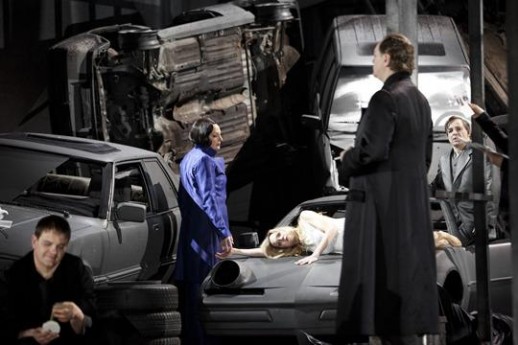
She’s the stage director hired by the company to realize Lulu for its Festtage 2012. She believes Berg erred in stretching to seven scenes and has corrected the mistake by axing Lulu and Alwa’s “geräumiger Salon” in Paris, or Scene Six. This, not incidentally, is one of two scenes recovered with global fanfare in 1979 after Helene Berg died.
A roomy or “luxurious” salon would not in any case have suited Breth’s conception of this opera, which remains locked for its 150 minutes in a gray warehouse decorated by a cluster of crashed cars, à la Hard Rock Café.
The cameras that will no doubt document her insight will frolic on the warehouse’s varied firm surfaces as they roam and frame at the director’s whim, leading perhaps to a valued DVD. But the theater audience member, confined to one paid seat (at prices starting at 65 euros), endures one sole perspective, even as Berg’s libretto requests a painter’s studio, Lulu’s apartment, a theater dressing room, and so on.
To counter her self-imposed visual monotony, Breth deploys relentless mime. We watch action that has not yet occurred in the story unfold ahead of time, and repeatedly. The athlete shadow-boxes back and forth. Gräfin Geschwitz (Deborah Polaski) gets punched in the stomach several times. Not one but two Doppelgängerinnen enact facets of Lulu’s life, while Lulu herself (Mojca Erdmann) is nailed to a door frame, set ablaze with gasoline, and gored in the vagina.
This hyper-action lies atop Berg’s own scheme of shock, and the result conversely is less shocking. The written drama wanders out of focus. At several points a brief delay occurs before we detect which one of the many moving bodies is singing. So the evening feels long, despite the jettisoned music.
At the second performance of the run, on April 4, Polaski and Michael Volle (as Doktor Schön) sang expressively and with reserves of power, though their portrayals were inevitably blunted by the parallel stage activity. Thomas Piffka supplied the “jugendlicher Heldentenor” needed for Alwa.
Erdmann’s pretty protagonist moved as if born to the role in a silver sequined dress. She navigated the vocal stratosphere appealingly too, even if a handful of phrases ended a tad short. Supporting roles were effectively assigned.
The Staatskapelle played with refinement in its deeply sunken pit to a house shy of capacity by about 200 seats.
Out of sight, compliant Barenboim brought a chamber musician’s attention to balances, honing Berg’s sumptuous colors and poignant characterizations as few conductors can. Why he has deprived himself of Friedrich Cerha’s acclaimed edition of Act III, and us of what might have been a definitive new reading of the score, we may never know.
Photo: Bernd Uhlig


